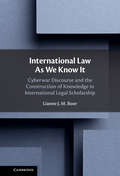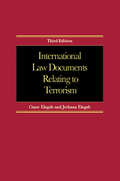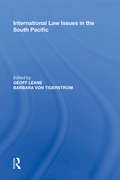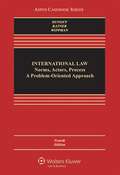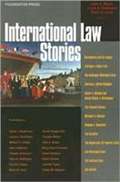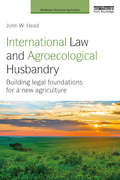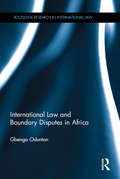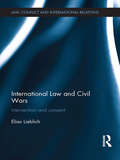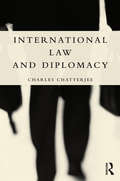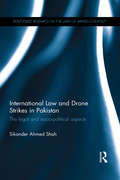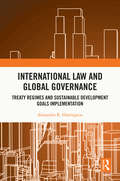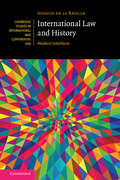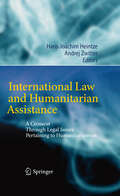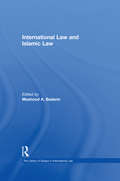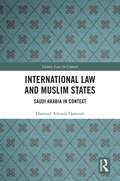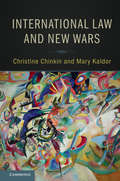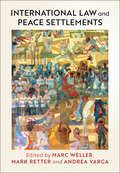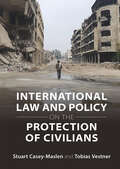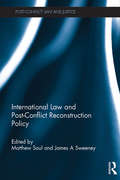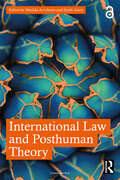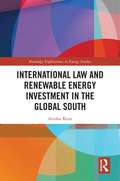- Table View
- List View
International Law As We Know It: Cyberwar Discourse and the Construction of Knowledge in International Legal Scholarship
by Lianne J. BoerInternational legal scholars tend to think of their work as the interpretation of rules: the application of a law 'out there' to concrete situations. This book takes a different approach to that scholarship: it views doctrine as a socio-linguistic practice. In other words, this book views legal scholars not as law-appliers, but as constructing knowledge within a particular academic discipline. By means of three close-ups of the discourse on cyberwar and international law, this book shows how international legal knowledge is constructed in ways usually overlooked: by means of footnotes, for example, or conference presentations. In so doing, this book aims to present a new way of seeing international legal scholarship: one that pays attention to the mundane parts of international legal texts and provides a different understanding of how international law as we know it comes about.
International Law Documents
by Jan KlabbersThis concise collection of the most important international law instruments is an essential resource for all students of international law. In addition to standard instruments such as the UN Charter, human rights documents and the UN Convention on the Law of the Sea, the volume also features topics not usually included in similar collections, such as international labour instruments, the work of the G20, and bilateral and unilateral instruments. Taking a global approach, the collection incorporates American, African and Asian instruments alongside UN, EU and other international documents, to reflect the diverse nature of international law courses. The two-colour design aids student navigation through the materials, and lengthier documents such as UNCLOS and the ICC statute are presented in shortened form, making the volume concise and clear. An ideal companion for students of international law, the book is also valuable for students of international human rights law, international relations, global governance and international politics.
International Law Documents Relating To Terrorism
by Omer Elagab Jeehaan ElagabSince 9/11, terrorism has been at the forefront of global politics and international relations. This new edition has been thoroughly updated and provides a comprehensive compilation of international law documents relating to terrorism. Covering the main instruments passed by the United Nations, regional organizations and the State practice of the US and the UK on the issue of combating terrorism in one handy volume, it covers the most recent instruments in the field of combating terrorism, such as: the International Convention for the Suppression of the Financing of Terrorism the Financial Action Task Force Revised Forty Recommendations on Money Laundering the Special Recommendations on Money Laundering the Special Recommendations on Terrorist Financing. The collection is introduced by the authors with an explanation of the salient issues relating to terrorism and proposals on how it can be combated. International Law Documents Relating to Terrorism provides, in a single text, all the basic documents in international law relating to terrorism, paying particular attention to the Lockerbie bombing case and the developments since 9/11.
International Law Frameworks
by David J. BedermanInternational law can mean many different things. This volume develops a framework for understanding international law: what it means today.
International Law Issues in the South Pacific: Policies And Practices
by Barbara von TigerstromExploring a selection of current issues in international law as they pertain to South Pacific countries and Antarctica, this volume covers diverse topics including mass refugee flows, transnational crime, international terrorism, freedom of navigation, climate change, international trade agreements and bioprospecting in Antarctica. As well as presenting a critical evaluation of these issues, the book offers an introduction to the South Pacific region and the instruments and institutional arrangements which facilitate co-operation and co-ordination within it. Tensions and interactions with external forces emanating from the global community and from key players outside the region are analyzed in the context of particular issues. International Law Issues in the South Pacific will be a valuable resource for students, researchers and policy makers with an interest in the region and in contemporary international law issues.
International Law Norms, Actors, Process: A Problem-Oriented Approach
by Jeffrey L. Dunoff David Wippman Steven R. RatnerIntroduction to International Law and Law Making, Participants in the International Legal Process, International Law and Domestic Law, The Protection of Human Dignity, Interdependence and Integration: The Challenge of Collective Action Problems, Challenges to International Law.
International Law Stories (Law Stories Ser.)
by John Noyes Laura Dickinson Mark JanisThis new Law Stories title sets the most significant international law cases in their social, political, and historical context. It showcases thirteen essays by leading international law experts. The essays, written in an accessible form, are organized in three groupings: stories about the development of international human rights law, stories about the use of international law in the U.S. legal system, and stories about international law's impact on interstate politics and the global economy. Experienced international law scholars, teachers, and practitioners will discover valuable new insights, and readers new to international law will find that the book quickly immerses them in the core controversies and most significant developments in the field.
International Law and Agroecological Husbandry: Building legal foundations for a new agriculture (Earthscan Food and Agriculture)
by John W. HeadRemarkable advances are being made in life science and agricultural research to reform the methods of food production, particularly with regard to staple grain and legume crops, in ways that will better reflect ecological realities. However, advances in science may be insufficient to ensure that these possibilities for agricultural reform are realized in practice and in a sustainable way. This book shows how these can only be achieved through changes in legal norms and institutions at the global level. Interdisciplinary in character, the book draws from a range of issues involving agricultural innovation, international legal history and principles, treaty commitments, global institutions, and environmental challenges, such as climate change, to propose broad legal changes for transforming global agriculture. It first shows how modern extractive agriculture is unsustainable on economic, environmental, and social grounds. It then examines the potential for natural-systems agriculture (especially perennial-polyculture systems) for overcoming the deficiencies of modern extractive agriculture, especially to offset climate change. Finally it analyses closely the legal innovations that can be adopted at national and international levels to facilitate a transition from modern extractive agriculture to a system based more on ecological principles. In particular the author argues for the creation of a Global Convention on Agroecology.
International Law and Boundary Disputes in Africa (Routledge Research in International Law)
by Gbenga OduntanAfrica has experienced a number of territorial disputes over land and maritime boundaries, due in part to its colonial and post-colonial history. This book explores the legal, political, and historical nature of disputes over territory in the African continent, and critiques the content and application of contemporary International law to the resolution of African territorial and border disputes. Drawing on central concepts of public international law such as sovereignty and jurisdiction, and socio-political concepts such as colonialism, ethnicity, nationality and self-determination, this book interrogates the intimate connection that peoples and nations have to territory and the severe disputes these may lead to. Gbenga Oduntan identifies the major principles of law at play in relation to territorial, and boundary disputes, and argues that the predominant use of foreign based adjudicatory mechanisms in attempting to deal with African boundary disputes alienates those institutions and mechanisms from African people and can contribute to the recurrence of conflicts and disputes in and among African territories. He suggests that the understanding and application of multidisciplinary dispute resolution mechanisms and strategies can allow for a more holistic and effective treatment of boundary disputes. As an in depth study into the legal, socio-political and anthropological mechanisms involved in the understanding of territorial boundaries, and a unique synthesis of an African jurisprudence of international boundaries law, this book will be of great use and interest to students, researchers, and practitioners in African and Public International Law, International Relations, and decision-makers in need of better understanding the settlement of disputes over territorial boundaries in both Africa and the wider world.
International Law and Civil Wars: Intervention and Consent (Law, Conflict and International Relations)
by Eliav LieblichThis book examines the international law of forcible intervention in civil wars, in particular the role of party-consent in affecting the legality of such intervention. In modern international law, it is a near consensus that no state can use force against another – the main exceptions being self-defence and actions mandated by a UN Security Council resolution. However, one more potential exception exists: forcible intervention undertaken upon the invitation or consent of a government, seeking assistance in confronting armed opposition groups within its territory. Although the latter exception is of increasing importance, the numerous questions it raises have received scant attention in the current body of literature. This volume fills this gap by analyzing the consent-exception in a wide context, and attempting to delineate its limits, including cases in which government consent power is not only negated, but might be transferred to opposition groups. The book also discusses the concept of consensual intervention in contemporary international law, in juxtaposition to traditional legal doctrines. It traces the development of law in this context by drawing from historical examples such as the Spanish Civil War, as well as recent cases such those of the Democratic Republic of the Congo, Somalia, Libya, and Syria. This book will be of much interest to students of international law, civil wars, the Responsibility to Protect, war and conflict studies, and IR in general.
International Law and Diplomacy
by Charles ChatterjeeIn this work the author explores the subjects of sovereignty, diplomacy and the function of diplomats, diplomatic missions, protocol, ethics in diplomacy, the role of Ministries of Foreign Affairs, intergovernmental conferences and the United Nations. It: includes a useful glossary of over sixty essential terms (such as Calvo Doctrine, Extradition, Rapporteur and Uti Possidetis Juris) clearly relates the conduct of diplomacy to the principles of international law. This volume will appeal to graduate and undergraduate students studying diplomacy, public administration and international relations courses as well as practising diplomats, international organization and foreign ministry officials and those who have regular dealings with them.
International Law and Drone Strikes in Pakistan: The Legal and Socio-political Aspects (Routledge Research in the Law of Armed Conflict)
by Sikander Ahmed ShahWhile conventional warfare has an established body of legal precedence, the legality of drone strikes by the United States in Pakistan and elsewhere remains ambiguous. This book explores the legal and political issues surrounding the use of drones in Pakistan. Drawing from international treaty law, customary international law, and statistical data on the impact of the strikes, Sikander Ahmed Shah asks whether drone strikes by the United States in Pakistan are in compliance with international humanitarian law. The book questions how international law views the giving of consent between States for military action, and explores what this means for the interaction between sovereignty and consent. The book goes on to look at the socio-political realities of drone strikes in Pakistan, scrutinizing the impact of drone strikes on both Pakistani politics and US-Pakistan relationships. Topics include the Pakistan army-government relationship, the evolution of international institutions as a result of drone strikes, and the geopolitical dynamics affecting the region. As a detailed and critical examination of the legal and political challenges presented by drone strikes, this book will be essential to scholars and students of the law of armed conflict, security studies, political science and international relations.
International Law and Global Governance: Treaty Regimes and Sustainable Development Goals Implementation
by Alexandra R. HarringtonThis book explores the methods through which international law and its associated innovative global governance mechanisms can strengthen, foster and scale up the impacts of treaty regimes and international law on the ability to implement global governance mechanisms. Examining these questions through the lens of the Sustainable Development Goals (SDGs), the book looks at environmental, social and economic treaty regimes. It analyses legal methodologies as well as comparative methods of assessing the relationship between the SDGs and treaty regimes and international law. Contradictions exist between international treaty regimes and principles of international law resulting in conflicting implementation of the treaty regimes and of global governance mechanisms. Without determining these areas of contest and highlighting their detrimental impacts, the SDGs and other efforts at global governance cannot maximize their legal and societal benefits. The book concludes by suggesting a path forward for the SDGs and for international treaty regimes that is forged in a solid understanding and application of the advantages of global governance mechanisms, including reflections from the COVID-19 pandemic experience. Addressing the strengths, gaps and weaknesses related to treaty regimes and global governance mechanisms, the book provides readers with a comprehensive understanding of this increasingly important topic. It will be of interest to students, researchers and practitioners with an interest in sustainability and law.
International Law and History: Modern Interfaces (Cambridge Studies in International and Comparative Law #152)
by Ignacio de la RasillaThis interdisciplinary exploration of the modern historiography of international law invites a diverse assessment of the indissoluble unity of the old and the new in the most global of all legal disciplines. The study of the history of international law does not only serve a better understanding of how international law has evolved to become what it is and what it is not. Its histories, which rethink the past in the present, also influence our perception of contemporary matters in international law and our understandings of how they may potentially unfold. This multi-perspectival enquiry into the dominant modes of international legal history and its fundamental debates may also help students of both international law and history to identify the historical approaches that best suit their international legal-historical perspectives and best address their historical and legal research questions.
International Law and Humanitarian Assistance
by Andrej Zwitter Hans-Joachim HeintzeIt is becoming increasingly apparent that there are major gaps in International Humanitarian Law and Public International Law in the area of humanitarian assistance. In response international organizations such as the UN and the EU are developing their own legal frameworks for humanitarian assistance and the body of customary law and so-called international disaster response law is growing steadily. This however shows that a coherent body of law is far from being a given. The legal reality of international law pertaining to emergency response is rather broadly spread over various international legal fields and related documents, covering situations of armed conflict and natural disasters. This book is one of the first attempts of linking different legal areas in the growing field of what could be called the international law of humanitarian assistance.
International Law and Islamic Law
by MashoodA. BaderinThe relationship between modern international law and Islamic law has raised many theoretical and practical questions that cannot be ignored in the contemporary study and understanding of both international law and Islamic law. The significance and relevance of this relationship in both academic and practical terms, especially after the terrorist attacks of 11 September 2001, is now well understood. Recent international events in particular corroborate the need for a better understanding of the relationship between contemporary international law and Islamic law and how their interaction can be explored and improved to enhance modern international relations and international law. The articles reproduced in this volume examine the issues of General Principles of International Law, International Use of Force, International Humanitarian Law, International Terrorism, International Protection of Diplomats, International Environmental and Water Law, Universality of Human Rights, Women's Rights, Rights of the Child, Rights of Religious Minorities, and State Practice. The essays have been carefully selected to reflect, as much as possible, the different Islamic perspectives on each of these aspects of international law.
International Law and Its Discontents
by Barbara StarkIn Civilization and its Discontents, Sigmund Freud argued that civilization itself is the major source of human unhappiness, inhibiting instincts and generating guilt. In Globalization and its Discontents, Joseph Stiglitz shows how the 'economic architecture' that produced globalization has also driven the backlash against it. This book brings together some of international law's most outspoken 'discontents'; those who situate their malaise in international law itself. Their shared objective is to expose international law's complicity in the ongoing economic and financial global crises and to assess its capacity - and its will - to constructively address them. Some, like Freud, view that which holds us together as an inevitable source of discontent. Others, like Stiglitz, draw on the energy of the backlash. How have these crises affected particular groups, sovereign states, and international law itself? How have they responded? When does crisis serve as a catalyst, and for what?
International Law and Muslim States: Saudi Arabia in Context (Islamic Law in Context)
by Dawood Adesola HamzahThis book analyses the general interaction between international law and Islamic law in the Muslim world today. It interrogates factors that often form the root of the tension between the two legal regimes. Literalist interpretations of Islamic law and the modern international law's disposition that does not give due consideration to differences among cultures and civilizations are some of these factors. This work examines the Saudi Arabia textualist approach to the two primary sources of law in Islam, the Qur’an and Sunnah, and argues that a liberal approach of interpretation has become sine qua non especially now that myriad issues are confronting the Muslim world generally and Saudi Arabia in particular. Similarly, globalization has generated an unprecedented multi-culturalism, legal-pluralism, and trans-border interactions in socio-economic and political relations. Therefore, Saudi Arabia, as the bastion of Islam and Islamic nations, is faced with the imperative of adopting a liberal approach to interpretation of Islamic law, with a view to accommodating a wide spectrum of other laws and cultures. The book provides a timely examination of the issue of modern Saudi Arabia, Islamic legal order vis-à-vis the contemporary concept of international law and international relations in specific areas such as international human rights law and trans-national economic matters. As such it will be of interest to academics and researchers working in Islamic law, international and comparative law, human rights law, and law and religion.
International Law and New Wars
by Mary Kaldor Christine ChinkinInternational Law and New Wars examines how international law fails to address the contemporary experience of what are known as 'new wars' - instances of armed conflict and violence in places such as Syria, Ukraine, Libya, Mali, the Democratic Republic of Congo and South Sudan. International law, largely constructed in the nineteenth and twentieth centuries, rests to a great extent on the outmoded concept of war drawn from European experience - inter-state clashes involving battles between regular and identifiable armed forces. The book shows how different approaches are associated with different interpretations of international law, and, in some cases, this has dangerously weakened the legal restraints on war established after 1945. It puts forward a practical case for what it defines as second generation human security and the implications this carries for international law.
International Law and Peace Settlements
by Marc Weller Mark Retter Andrea VargaInternational Law and Peace Settlements provides a systematic and comprehensive assessment of the relationship between international law and peace settlement practice across core settlement issues, e.g. transitional justice, human rights, refugees, self-determination, power-sharing, and wealth-sharing. The contributions address key cross-cutting questions on the legal status of peace agreements, the potential for developing international law, and the role of key actors – such as non-state armed groups, third-state witnesses and guarantors, and the UN Security Council – in the legalisation and internationalisation of settlement commitments. In recent years, significant scholarly work has examined facets of the relationship between international law and peace settlements, through concepts such as jus post bellum and lex pacificatoria. International Law and Peace Settlements drives forward the debate on the legalisation and internationalisation of peace agreements with diverse contributions from leading academics and practitioners in international law and conflict resolution.
International Law and Policy on the Protection of Civilians
by Stuart Casey-Maslen Tobias VestnerThis is the first comprehensive treatment of international law and policy on the protection of civilians in armed conflict. In addition to international humanitarian and human rights law, jus ad bellum, disarmament law, and international criminal law are all critical to civilian protection. The book offers in-depth analysis and explanation of the normative framework while also outlining and discussing the policies of concerned States and international and humanitarian organisations. The role of the United Nations as a key actor is considered along with regional organisations such as the African Union, the European Union, and NATO. Particular attention is given to those at direct risk of harm during armed conflict, including children, women, persons with disabilities, and LGBTI persons.
International Law and Post-Conflict Reconstruction Policy (Post-Conflict Law and Justice)
by Matthew Saul James A. SweeneyThe trend for international engagement in post-conflict reconstruction has produced a host of best-practice postulates on topics such as local involvement in decision-making, accountability for past atrocities, sensitivity to context, and the construction of democratic institutions of governance. International law has potential relevance for many of these themes, yet the question of how the implementation of best-practice policy recommendations might be affected by international law remains under-examined. This book offers a fuller understanding of the role of international law in the practice of post-conflict reconstruction. It explores how international legal issues that arise in the post-conflict period relate to a number of strands of the policy debate, including government creation, constitution-making, gender policy, provision of security, justice for past atrocities, rule of law development, economic recovery, returning displaced persons, and responsibilities of international actors. The chapters of the book work to reveal the extent to which international law figures in the policy of internationally enabled post-conflict reconstruction across a range of sectors. They also highlight the scope for international law to be harnessed in a more effective manner from the perspective of the transition to peace and stability. The book lays out a basis for future policy making on post-conflict reconstruction; one that is informed about the international legal parameters, and more aware of how international law can be utilized to promote key objectives.
International Law and Posthuman Theory
by Emily Jones Matilda ArvidssonAssembling a series of voices from across the field, this book demonstrates how posthuman theory can be employed to better understand and tackle some of the challenges faced by contemporary international law. With the vast environmental devastation being caused by climate change, the increasing use of artificial intelligence by international legal actors and the need for international law to face up to its colonial past, international law needs to change. But in regulating and preserving a stable global order in which states act as its main subjects, the traditional sources of international law – international legal statutes, customary international law, historical precedents and general principles of law – create a framework that slows down its capacity to act on contemporary challenges, and to imagine futures yet to come. In response, this collection maintains that posthuman theory can be used to better address the challenges faced by contemporary international law. Covering a wide array of contemporary topics – including environmental law, the law of the sea, colonialism, human rights, conflict and the impact of science and technology – it is the first book to bring new and emerging research on posthuman theory and international law together into one volume. This book’s posthuman engagement with central international legal debates, prefaced by the leading scholar in the field of posthuman theory, provides a perfect resource for students and scholars in international law, as well as critical and socio-legal theorists and others with interests in posthuman thought, technology, colonialism and ecology.
International Law and Posthuman Theory
by Emily Jones Matilda ArvidssonAssembling a series of voices from across the field, this book demonstrates how posthuman theory can be employed to better understand and tackle some of the challenges faced by contemporary international law.With the vast environmental devastation being caused by climate change, the increasing use of artificial intelligence by international legal actors and the need for international law to face up to its colonial past, international law needs to change. But in regulating and preserving a stable global order in which states act as its main subjects, the traditional sources of international law – international legal statutes, customary international law, historical precedents and general principles of law – create a framework that slows down its capacity to act on contemporary challenges, and to imagine futures yet to come. In response, this collection maintains that posthuman theory can be used to better address the challenges faced by contemporary international law. Covering a wide array of contemporary topics – including environmental law, the law of the sea, colonialism, human rights, conflict and the impact of science and technology – it is the first book to bring new and emerging research on posthuman theory and international law together into one volume.This book’s posthuman engagement with central international legal debates, prefaced by the leading scholar in the field of posthuman theory, provides a perfect resource for students and scholars in international law, as well as critical and socio-legal theorists and others with interests in posthuman thought, technology, colonialism and ecology.Chapters 1, 9 and 11 of this book is freely available as a downloadable Open Access PDF at http://www.taylorfrancis.com under a Creative Commons Attribution-Non Commercial-No Derivatives (CC-BY-NC-ND) 4.0 license.
International Law and Renewable Energy Investment in the Global South (Routledge Explorations in Energy Studies)
by Avidan KentThis book will discuss the legal tools offered by international law that can support foreign direct investment (FDI) in the renewable energy sector in the Global South. Promoting and increasing investment in the renewable energy sector is crucial for limiting global temperature rise to 1.5°C and addressing energy poverty in the Global South. In this volume, Kent explores the various home-country measures (HCMs) offered by international law that support FDI in the renewable energy sector. This book provides a bird’s eye evaluation of HCMs from fields such as trade law, investment law, environmental law, development law and more. It reveals that while international law indeed offers many legal tools to support investors’ needs, the current legal framework is fragmented; most legal instruments were designed in isolation and the potential for mutually-supportive, synergetic policies has been explored only to a limited extent. This fragmented reality is in contradiction to the notion of Policy Coherence for Development, which is increasingly gaining support in leading institutions in Europe and elsewhere. This book will provide recommendations on the manner in which HCMs can be connected in order to maximise their potential and boost investment in renewable energies in the developing world. International Law and Renewable Energy Investment in the Global South will be of great interest to scholars, students, and practitioners of international law, energy studies, development studies and IR more broadly.
